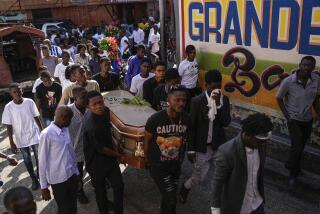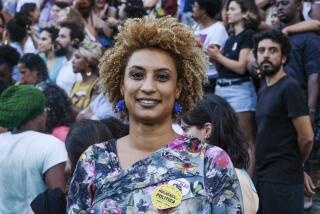Brazil stunned by Rio slum deaths
- Share via
RIO DE JANEIRO — The twisting alleys and steep steps of Providence Hill ascend relentlessly to a tree-less plaza, a place of respite, however bleak, from the drug wars and blight that have made the Rio neighborhoods known as favelas global emblems of urban dysfunction.
But these days the concrete park offers no peace, for it is here that three young men were snatched away -- not by the traffickers, but by the troops who had been deployed here to protect the people of Providence Hill.
Eleven soldiers have been arrested and accused of detaining the men at the plaza in June and turning them over to thugs in the rival Mineira Hill favela, authorities say. The troops were trying to “scare” the unruly young men, according to subsequent testimony. Instead, the three turned up dead in a vast trash heap on the edge of town, shot dozens of times, their bodies badly disfigured.
A nation anesthetized to daily dispatches of mayhem from the slums was stunned by the turn of events in Rio’s most historic favela -- which even a century ago a local paper called “the hide-out of people who are willing to kill for any reason, or even for no reason at all.”
“An abominable act,” declared President Luiz Inacio Lula da Silva, whose government has promised aggressive prosecution of the guilty and compensation for the bereaved, blaming a rogue military unit for the killings.
The irony is that the army generally enjoyed higher standing in the favelas than the police, widely assailed as brutal and corrupt, and sometimes in cahoots with shady militiamen who serve as ad hoc executioners.
“I always wanted my son to join the army,” said Maria de Fatima Barbosa, whose son, Marcos Paulo Campos, 17, was among the slain, his body apparently dragged through the streets of the rival favela as a macabre trophy. “But after this, who would want their kid to sign up?”
She couldn’t summon the courage for a last look at her battered boy. Her daughter made the identification.
“She said he looked like a monster,” Barbosa, 48, said, breaking into tears on a patio here on the hill, with the kind of panoramic view of Rio’s Guanabara Bay that only a hillside favela can offer. “I have a hole in my heart.”
Relatives insist that none of the young men ran with the Red Command (Comando Vermelho), the drug mob that holds sway on Providence Hill. The faction’s spray-painted tag, CV, is a ubiquitous admonition as to its preeminence.
“Even if they were criminals, what right did the army have to do this?” asked Lilian Gonzaga, mother of 19-year-old Wellington Gonzaga Costa, shot 26 times, apparently while his hands were tied behind his back.
“They ruined my life.”
These days, Wellington’s little brother, 14, a wiry, baby-faced child of the hill, talks of “becoming a bad guy” and exacting revenge on the killers.
“He wants to take justice into his own hands,” says Gonzaga, a maid, voicing the hope that she can move him to a safer environment.
The victims -- the third was 24-year-old David Wilson da Silva -- had familiar favela profiles: They played amateur soccer, toiled at menial jobs and lived for the pulsating weekend bailes funk (funk dances) that are a hallmark of life here.
The soldiers, typically young men of impoverished origins, got mixed reviews during their six months or so patrolling Providence Hill in their deployment to manage and protect an acclaimed construction project to refurbish the decrepit housing stock.
Residents at lower elevations, where the construction work was concentrated, generally credited troops with reducing crime. Higher up, where the lanes narrow and become more ominous, some call the soldiers provocateurs, harassing girls and even playing taped rap ballads of rival gangs.
“They would whistle at us and shout, ‘Hey, hot stuff.’ ” said Wellington’s older sister, who asked not to be named, fearing that she would be targeted.
Providence Hill is a throbbing, vertical accretion of structures of eclectic shapes, sizes and colors wedged together like an anarchic, tropical Legoland.
Some homes are narrow concrete towers; others are one-room pillboxes. Bundles of electrical and phone cables hover above the claustrophobic streets like coils of dark snakes suspended in air; jury-rigged lines veer off to homes and shops. Storefront evangelical chapels proliferate.
The beats of hip-hop and samba provide a continual rhythmic backdrop -- an apt score for a hill that looks down on Samba City, the massive complex where the signature floats are constructed for Rio’s annual Carnaval extravaganza. Bullet holes scar many homes; folks know to get down fast when the fireworks start.
Although residents don’t dispute the dangers prowling the warren of dark lanes, they call Providence Hill the heart and soul of Rio, a place where a sense of kinship flourishes. People watch out for each other. No stranger enters without being noticed. While routinely labeled a crime-ridden “slum” or “shantytown,” the hill is home mostly to hard-working families that have been here for a generation or more.
“I wouldn’t live anywhere else but here,” said Janete Ferreira, 70, a grandmother and resident for 46 years. “But what the soldiers did to those boys was unforgivable.”
According to witness and police accounts, the three were returning from a Friday night funk bash in the Mangueira favela on the morning of June 14 when they scuffled with troops at the plaza. Soldiers detained the three and transported them to an army barracks.
Later, residents say, the army refused to divulge where the three had been taken. A frantic search ensued.
A neighbor, Antonio Cerqueira, said he dialed a cellphone held by one of the missing youths. A gruff voice answered and promptly addressed Cerqueira with a pejorative slang term used for Red Command gang-bangers.
“You’re wrong, these are good boys,” Cerqueira says he pleaded with his unknown interlocutor.
Back came a mocking reply: “Listen to your mistake!”
The line crackled with screams and cries for help, says Cerqueira, a dockworker. He’s sure the shrieks were from the captive youths. Then the phone went dead.
The victims’ remains were found the next day in the garbage dump. The police precinct chief, Ricardo Dominguez, told reporters that the soldiers had sought to impose a “correction” for what they considered the trio’s disrespectful attitude.
The army’s commanding officer at the scene, Lt. Vinicius Ghidetti, broke into tears when testifying last month in criminal court. He swore that he hadn’t meant for the boys to be killed in the rival favela, just to be taught a lesson.
“I only wanted to scare them, make them feel afraid,” Ghidetti said.
He and seven subordinates face murder-related charges and as much as 30 years in prison if convicted, along with a court-martial. Three other soldiers were released for lack of evidence.
After the killings, a judge ordered the army off Providence Hill. The construction work was suspended.
The hill lost out on a government promise to fix its ramshackle housing stock.
And three mothers lost their sons.
“I couldn’t even kiss my boy goodbye,” said a distraught Barbosa, mother of Marcos Paulo. “I just pray that other mothers won’t have to suffer like this, that something like this never happens again.”
--
patrick.mcdonnell@latimes.com
McDonnell was recently on assignment in Rio. Special correspondents Marcelo Soares and Natanael Damasceno contributed to this report.More to Read
Sign up for Essential California
The most important California stories and recommendations in your inbox every morning.
You may occasionally receive promotional content from the Los Angeles Times.










